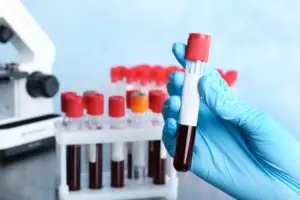
Get Disability Benefits For Blood Disorders
If you’re suffering from a serious blood disorder, you may qualify for Social Security Disability (SSD) benefits. In order to qualify, the disorder must be severe enough to impair your ability to work and you must meet certain additional requirements. Below, we explain the basic criteria for collecting disability for a blood disorder.
For help with the application process or for questions specific to your case, contact our disability attorneys at Berger and Green in Pittsburgh. The no-pressure, informative consultation is free: 412-661-1400.
40+ years of experience from strong, knowledgeable, compassionate attorneys.
Start A Free EvaluationAre blood disorders considered disabling?
The Social Security Administration (SSA) has a strict definition of what qualifies as a disability: “The law defines disability as the inability to engage in any substantial gainful activity (SGA) by reason of any medically determinable physical or mental impairment(s) which can be expected to result in death or which has lasted or can be expected to last for a continuous period of not less than 12 months.”
There are two ways to meet this definition of disabled. The first way is to prove that you have one the impairments found in the SSA’s Blue Book, which lists disabling impairments, and that you meet the severity criteria for the listing. Most blood disorders are found in Section 7.00 of the Blue Book, although cancerous hematological disorders, such as lymphoma, leukemia, and multiple myeloma, are listed in Section 13.00. Some of the listed blood disorders that can qualify you as disabled include:
- Hemolytic anemias, such as sickle cell disease and thalassemia;
- Hematological disorders treated by bone marrow or stem cell transplantation;
- Disorders of thrombosis and hemostasis, like hemophilia and thrombocytopenia; and
- Disorders of bone marrow failure, such as myelodysplastic syndromes, aplastic anemia, granulocytopenia, and myelofibrosis.
If you have a listed condition, your records must show that you meet certain criteria for the SSA to deem you as disabled. For instance, to qualify as disabled under the listing for bone marrow failure, you must also have either:
- Complications of bone marrow failure requiring at least three hospitalizations lasting 48 hours or more within a 12-month period and occurring at least 30 days apart; or
- Myelodysplastic syndromes or aplastic anemias that require life-long red blood cell transfusions at least once every six weeks.
We know you’re hurting. We can help. Free case evaluations, home and hospital visits.
Contact Us Now For HelpCan I qualify as disabled if my blood disorder is not listed?
If your blood disorder is not listed in the Blue Book or if it does not quite meet the criteria, you can still qualify as disabled if your condition is so severe it prevents you from working.
When the claims examiner looks over your medical records, he or she will assess your condition, signs, and symptoms, and review your Residual Functional Capacities (RFC) form that your doctor filled out. This form analyzes your basic skills that are necessary to work, such as sitting and standing for long periods, lifting objects, and bending.
The examiner will also consider your work history, education, age, and skills when deciding whether you can work. If the SSA determines that your condition causes such severe limitations that you cannot do your previous work and it is likely that you cannot adjust to new work, it may still grant you benefits based on a medical vocational allowance.
You need an attorney with the experience and dedication to give your case the care it deserves.
Start A Free EvaluationHow do I prove my disability to the SSA?
You must submit information about medical providers who have treated you for your blood disorder to the SSA. This includes:
- Lab reports and other medical tests;
- Notes from your doctors regarding your condition and limitations;
- A list of treatments you have undergone and your response to them; and
- How your condition impairs your abilities.
Medical evidence is essential in all disability claims. Failure to provide the right records will result in a denial of benefits. To ensure you have the evidence necessary to validate your claim, have a Berger and Green disability lawyer assist you with your application.
We can address all the legal hurdles that may be keeping you from getting a fair settlement.
Speak To An Attorney TodayWhat other criteria do I need to win disability benefits?
In addition to meeting the SSA’s definition of disabled—which takes into account the severity of your condition, how long it has lasted or is expected to last, and your ability to work—you must also meet the financial or work history requirements established by the organization. These requirements will vary depending on which benefit you are applying for. If you are filing for Social Security Disability Insurance (SSDI) benefits, you must have sufficient work credits on your record. On the other hand, if you are applying for Supplemental Security Income (SSI) benefits, your assets and income must fall below a certain threshold.
It can be difficult to determine which benefit program you may qualify for. Contact Berger and Green and schedule a free appointment to discuss your options. We can explain your rights, what steps to follow, and how to increase your chances of collecting benefits.
What if my claim for benefits was denied?
The SSA carefully scrutinizes each claim they receive and they deny most of the disability claims that people submit every year. If your claim for disability for a blood disorder was recently denied and you think the denial was unjustified, our attorneys at Berger and Green can help you appeal your case.
It’s important to note that there is a very short time limit on appeals and failure to take action before the deadline will nullify your case and you will have to reapply. That is why it is so important to act quickly. Call our office today at 412-661-1400 for immediate help with your claim.







